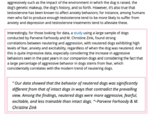B
BlueBeard
Guest
The effects of detrimental effects of castration can be reversed? I did not know this!
In another thread we discussed why some dogs can still ejaculate long after their castration. I personally had two "rescue" dogs (one we adopted, the other was from someone whose living arrangements could not longer permit a pet). Bewildered why they not only could knot but actually produce ejaculate years and years after their castration, I did a lot of research into how this could be. Apparently I had quit too soon. I guess I just figured the larger, nonzoosexual population would have no interest. That thread has piqued my interest once again into learning more. I wanted to know if we could restore a dog's normal, healthy sex life with hormone treatment.
That would be a huge relief to those zoos who love their dog, and their dog is everything, except for one frustrating thing: absence of a sex life.
Well, how narrow-minded and uniformed I've been!!! First, that's HARDLY the main concern for those with castrated animals. Castration poses an array of physical and mental health risks to the animal.
One tool in preventing, treating or even reversing these effects is hormone treatment. Here's just one site of the ones I'm strumming through right now.
https://healthyandhappydog.com/countering-the-effects-of-neuter/
What I'm wondering now is, in addition to reversing joint-related detriments like dysplasia, wouldn't these treatments also tend to improve a dog's sexual capabilities? Having no testicles, the dog would be sterile of course, but all of the other biological equipment is still intact and functional. In fact, the point of that other thread is that even without treatment, some few dogs still can and do get sustained erections, knot and ejaculate (surprises the heck out of people who, like I once did, mistakenly thought "cum" came from the nuts).
It certainly works for many castrated human males. Why not dogs?
How many frustrated dog zoos would like to know this, too? -- First you want it just for the health of the poor dog, of course. But... maybe... it can restore its sex life to normal, healthy levels, too?
(I don't know. I'm just now learning about this myself)
In another thread we discussed why some dogs can still ejaculate long after their castration. I personally had two "rescue" dogs (one we adopted, the other was from someone whose living arrangements could not longer permit a pet). Bewildered why they not only could knot but actually produce ejaculate years and years after their castration, I did a lot of research into how this could be. Apparently I had quit too soon. I guess I just figured the larger, nonzoosexual population would have no interest. That thread has piqued my interest once again into learning more. I wanted to know if we could restore a dog's normal, healthy sex life with hormone treatment.
That would be a huge relief to those zoos who love their dog, and their dog is everything, except for one frustrating thing: absence of a sex life.
Well, how narrow-minded and uniformed I've been!!! First, that's HARDLY the main concern for those with castrated animals. Castration poses an array of physical and mental health risks to the animal.
One tool in preventing, treating or even reversing these effects is hormone treatment. Here's just one site of the ones I'm strumming through right now.
https://healthyandhappydog.com/countering-the-effects-of-neuter/
What I'm wondering now is, in addition to reversing joint-related detriments like dysplasia, wouldn't these treatments also tend to improve a dog's sexual capabilities? Having no testicles, the dog would be sterile of course, but all of the other biological equipment is still intact and functional. In fact, the point of that other thread is that even without treatment, some few dogs still can and do get sustained erections, knot and ejaculate (surprises the heck out of people who, like I once did, mistakenly thought "cum" came from the nuts).
It certainly works for many castrated human males. Why not dogs?
How many frustrated dog zoos would like to know this, too? -- First you want it just for the health of the poor dog, of course. But... maybe... it can restore its sex life to normal, healthy levels, too?
(I don't know. I'm just now learning about this myself)
Last edited by a moderator:




